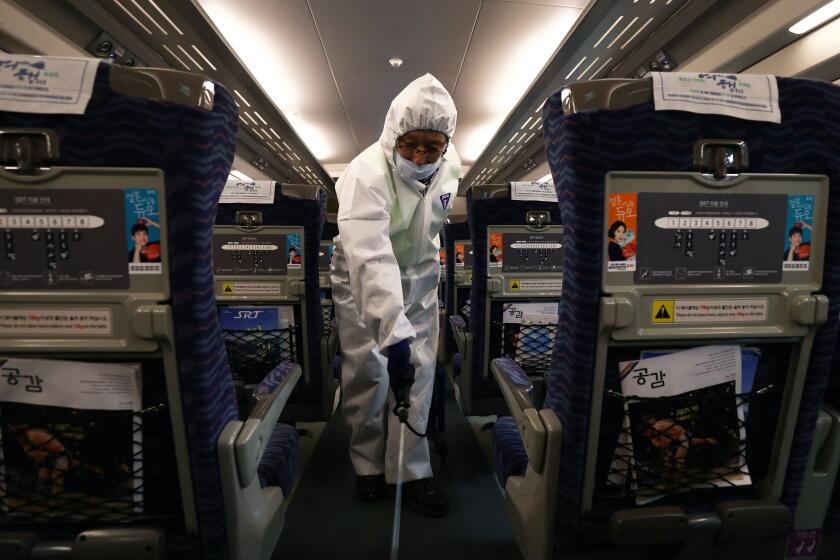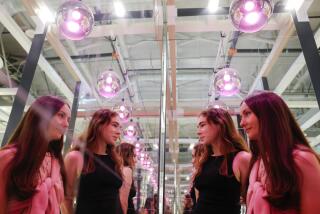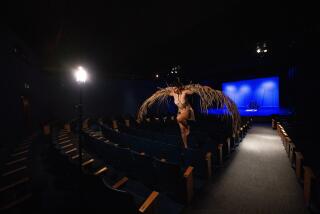They came to make art in isolation; the pandemic forced them to stay
Out on the tip of Cape Cod, Mass., in the 300-year-old community of Provincetown, some 2,900 year-round residents weather the deep freeze long after droves of summer people have departed. Embedded within this once-bohemian, colonial-era spit of land are 20 artists and writers who arrive every October and remain past the final frost. This year is no exception for the fellows of the Fine Arts Work Center (FAWC), even though most other artist colonies in the United States have shuttered in the wake of COVID-19.
Founded in 1968, the seven-month-long residency is meant to give its recipients time and space to produce work at what can some days feel like the end of the world. Writers like Michael Cunningham, Denis Johnson, Ann Patchett and Jacqueline Woodson have attended. To accept, many fellows must rearrange their lives entirely — find subletters, leave jobs, put relationships on hold. On March 18, the FAWC administration put protocols in place for residents to self-quarantine beyond the official end of the program — April 30 — until June 15.
Joy Priest, a poet at FAWC, wakes up each morning and handwrites her daily schedule on notebook paper in neat blue ballpoint pen. It’s something she’s always done — she chalks it up to being a Capricorn with a Virgo moon — but lately it’s felt even more necessary. Most mornings she walks her dog, Luna, along the Cape’s dunes. In the afternoon she works and afterward, instead of going to Governor Bradford, a restaurant where drag queens and fisherman share the bar, or to one of the fellows’ little cottage kitchens for a potluck, she logs into Zoom for readings with other writers across the country.
“Ironically, I already felt like I was in quarantine,” says Priest. “If you come to Provincetown for a winter, you should have some understanding of what that implies. It’s isolating.” Even so, she misses sharing meals and seeing residents along Commercial Street. It’s unclear how long shelter-in-place orders will last or what happens if they extend beyond the new departure date.
Authors like Lionel Shriver, Alexander McCall Smith, Laura Lippman and Steph Cha are under coronavirus quarantine too. Here’s what they’re reading.
If you aren’t familiar with the residency model, it may sound like a cushy retreat in the woods or a beach vacation — creative summer camp for adults. At the most competitive residencies, room and board and sometimes modest stipends are included. Getting stuck there in a pandemic could be construed as the artists’ corollary to that now-infamous honeymooning couple stuck in the Maldives. But the reality is these retreats constitute a support system for artists and writers struggling to cobble together a livelihood. Most of this season’s — and likely next season’s — resident-hopefuls, who would otherwise be making travel plans, will not be going anywhere. And even those stranded at the tip of Massachusetts are unsure of where they’ll go next.
Akiko Jackson, a visual artist, arrived in Provincetown fresh from the Roswell Artist-in-Residence Foundation in New Mexico. For a decade, she’s subsisted without a home base, traveling from one long-term residency to another to maintain a career. She says her summer schedule was filled “like a puzzle” with short-term residencies from June to September. As each fell through, along with three exhibitions, she’s scrambled to apply for assistance, a convoluted and time-consuming process.
Raul De Lara, a sculptor from Mexico at FAWC, is unsure where he’ll go next. His DACA status expires on May 7 and with immigration offices closed, he is unable to renew his papers. “I feel safe here,” he says of FAWC. “It’s a place I don’t have to be very exposed.” Though De Lara, who at 28 has been in the U.S. for 16 years, was awarded a relief grant, it’s unclear if he’ll be able to access the funds. He’s applied for a second year at FAWC but has yet to hear back; his studio is full of pieces he cannot move, and his art handler is closed. If all else fails, he’ll caravan to Texas with Priest.
A few hours north of Provincetown in New Hampshire is MacDowell, the storied 450-acre colony founded in 1907. It’s where James Baldwin wrote “Giovanni’s Room” and Thornton Wilder set down “Our Town.” Residents have been awarded 91 Pulitzers, 844 Guggenheim Fellowships and nine Academy Awards. The board decided to cancel arrivals and begin sending residents home on March 11. Through the Spanish flu and both World Wars, MacDowell has never before cut its season short.
David Macy, MacDowell’s longtime resident director, explained the very real economic value of a residency. The colony spends $12,000 per artist per month or $450 a day. The 35% to 40% of residents who qualify for stipends earn, on average, $18,000 a year, not far from the U.S. poverty threshold.
“There’s a lot of value you can’t describe easily,” Macy says, recounting the evening ritual of residents — sculptors, architects, poets, novelists, playwrights — gathering for dinner at MacDowell’s main house. “There’s a cross-pollination that happens organically.”
Governments and health officials around the world are trying to mitigate the spread of the coronavirus outbreak.
When the virus hit, the writer Wei Tchou was up at MacDowell completing an eight-week residency while working on a memoir. Out there in the woods, the threat of COVID-19 felt distant to her. She spent her first six weeks struggling to write, trying to figure out what it meant to identify as an artist apart from the mechanics of validation and economic survival in her New York home. Two weeks before the end of the program, Tchou finally hit her stride — just before Macy gave an emotional speech announcing the closure. “The universe has a really good sense of humor,” she says.
But the consequences of the closures are serious. The lack of federal support for arts in the United States has relegated all but blue-chip artists to the fringes of society, often without the resources to operate within the formal economy. It’s said that great art comes from struggle, but poverty bears little fruit. Residencies are a crucial stopgap.
Nearly a century ago, after the Great Depression, the country did put artists and writers to work. The Works Progress Administration employed tens of thousands of writers, musicians, artists and performers. Today, those who wish to devote themselves to their vocations without entering academia or the gig economy must undertake hundreds of hours of legwork to patch together enough residencies and fellowships to get by.
“It’s such an ecosystem,” says Sharon Dynak, the executive director of UCross, a residency on a 20,000-acre ranch in Clearmont, Wyo. UCross has hosted writers like Annie Baker, Karen Russell, Colson Whitehead and Annie Proulx. On March 16, with only three reported COVID-19 cases in Wyoming, UCross closed, helping to facilitate its residents’ safe passage home — as far as the Netherlands and Germany.
Noreen Tomassi, the executive director at the Center for Fiction in downtown Brooklyn, says she fears for the effect the pandemic will have on literature. “We’re all supposed to do yoga six times a day and write the great American novel,” she says. “But imagine if you’re a writer living in [New York]. You have two or three kids under the age of 8, you’re worried about your kids, you’re worried about your parents, you’re stuck in an apartment that’s way too small.” For many writers and artists with families, the daily escape hatch of a few uninterrupted hours has vanished.
“We can’t use the tools of corporate models if we want artists and writers to survive this moment,” says Priest, speaking from her cottage in Provincetown. “Some of these organizations’ loss of profit means they can collapse in a single cycle.” She says that at one point, residents received notice from FAWC that they would be charged rent past April 30, but after an organized effort, FAWC reversed its stance. Executive Director Richard MacMillan confirms that charging rent was one measure discussed, but ultimately “It wasn’t a match for our identity. They’re here as a continuing gift.”
Priest grew up in a working class family in Kentucky and says her disabled mother relies on Social Security. Her first opportunity to leave home came when she was awarded a fellowship in 2015, and she’s relied on them ever since to protect her time and work. This summer, she’s weighing whether to head back to her parents in Lexington or go straight to Texas, where she’s pursuing a PhD at the University of Houston. But until shelter-in-place orders lift in Massachusetts, she’ll continue copying out her schedule each day, tracing the strange warp in time from a place that right now feels strangely permanent — but definitely isn’t.
Pariseau is a writer and editor in New Orleans.
More to Read
Sign up for our Book Club newsletter
Get the latest news, events and more from the Los Angeles Times Book Club, and help us get L.A. reading and talking.
You may occasionally receive promotional content from the Los Angeles Times.










